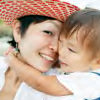[Children Part 2] Use telephoto lens to nail those shots of kids being kids
Capable of capturing large images of subjects from a long distance away, a telephoto lens is useful for taking photos of children. In this article, I will provide some tips on how to use such a lens. (Edited by: Camera Biyori, Photos by: Shino Chikura)

Capture the innocent expressions and movements of a playing child
Children run around a lot, so a telephoto zoom lens is recommended for taking photographs of them. For instance, even if the child runs to a distance away from you, you can continue taking photos from where you are and follow their movements with ease. In addition, shooting from a distance ensures that the child will be less mindful of the fact that they are being photographed, making it easy to capture their expressions and movements while they continue playing innocently. It is also useful for framing your shot while the child is playing with their father or their friends.
Be careful of camera shake when shooting with a telephoto lens. Maintaining a stable posture is a basic requirement in photography, but when shooting with telephoto lenses, a narrow range is magnified and captured, so even minor movements can easily cause camera shake. In this case, I recommend using a camera with an image stabiliser (IS, indicated by an “IS” in the product name of the lens), as an IS lens can suppress camera shake to a certain extent. If you are still concerned about camera shake, you can increase the ISO speed so that the shutter speed does not become too slow.
“Can't wait to get rid of these training wheels”

[Shooting Conditions]
Shooting location (weather): Outdoor (sunny)
Lighting condition: Light from the left side of the screen
EOS 750D/ EF-S55-250mm f/4-5.6 IS STM/ FL: 70mm/ f/4.5/ 1/640 sec/ ISO 400/ WB: Auto
The rocky ground made it hard to cycle and the child seemed a little wary so I had to coax her on as I took the shot. As I wanted to capture the straight path, I raised myself at a location with steps and shot slightly from above with a composition that widened the background.
“An evening walk along the river bank”

[Shooting Conditions]
Shooting location (weather): Outdoor (sunny)
Lighting condition: Light from the left side of the screen
EOS 750D/ EF-S55-250mm f/4-5.6 IS STM/ FL:135mm/ f/5.0/ 1/640 sec/ ISO 400/ WB: Auto
While strolling together along the river bank, I wanted to shoot a picture from an angle at a lower ground with the sky as the background, so I went down the steps while getting my daughter to stay at the top so that I could shoot from a distance. The orange sunset glow made it a lovely time to shoot.
“It's warm, just like mum”

[Shooting Conditions]
Shooting location (weather): Outdoor (sunny)
Lighting condition: From the top
EOS 750D/ EF-S55-250mm f/4-5.6 IS STM/ FL: 178mm/ f/5.6/ 1/800 sec/ ISO 400/ WB: Auto
Snuggling up to the plaything basked in the warmth of the sunlight. The movements and expressions of a child sprawling one minute and all of a sudden running around the next are extremely cute as well, aren't they? By shooting with a composition that seems to expand into the distance, a soft bokeh that can only be captured with a telephoto lens can also be created.
[TIP] A telephoto lens is useful for photographing children
Not only is it easier to capture photos from a long distance, telephoto lenses also have a unique characteristic of widening the bokeh effect in the background the longer the focal distance. 55-250mm or 55-200mm telephoto lenses are generally sold as DSLR kit lenses at reasonable prices. In addition, the lenses are equipped with IS (IMAGE STABILIZER), thus ensuring that camera shake does not occur easily even when taking hand-held shots.

[How to see the focal length]
The focal length represents the range of area that can be captured by the lens (= angle of view). Notations such as “18-55mm” etc., can be seen at the front and side of the lens. In this case, it means that the focal length ranges from 18mm to 55mm.

EOS 750D Kit (EF-S18-55mm IS STM)

Photographer and mother of two girls, one aged 4 and the other, a 1-year-old. After graduating from university, she went to Germany to study under Andre Rival and Ulrike Schamoni before going independent.

Camera Biyori is a Japanese photography magazine introducing charming photos and daily joy with cameras. Suggesting fun activities relating to cameras and photography, Camera Biyori editorial department also offer the "Camera Biyori Photography School" to recommend its readers to engage in photography and have fun.
Published by Daiichi Progress Inc.


































